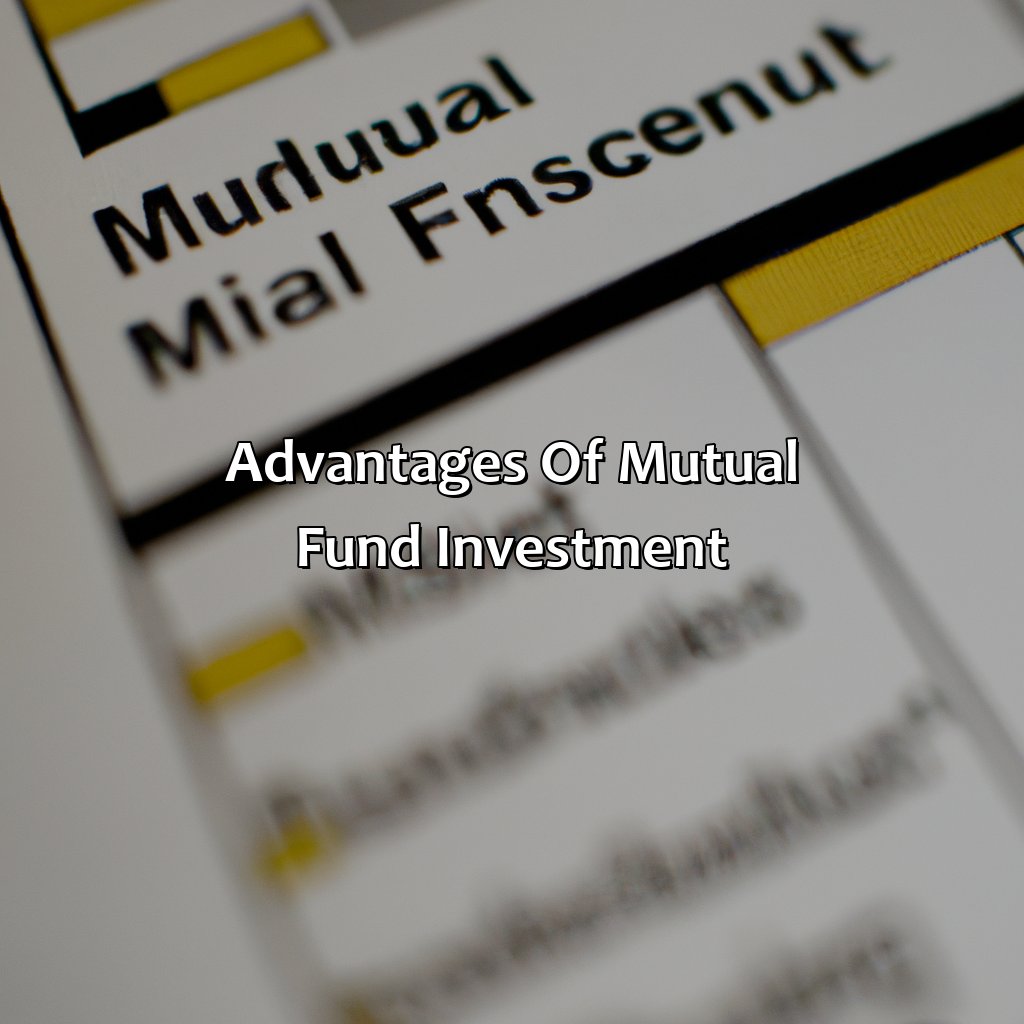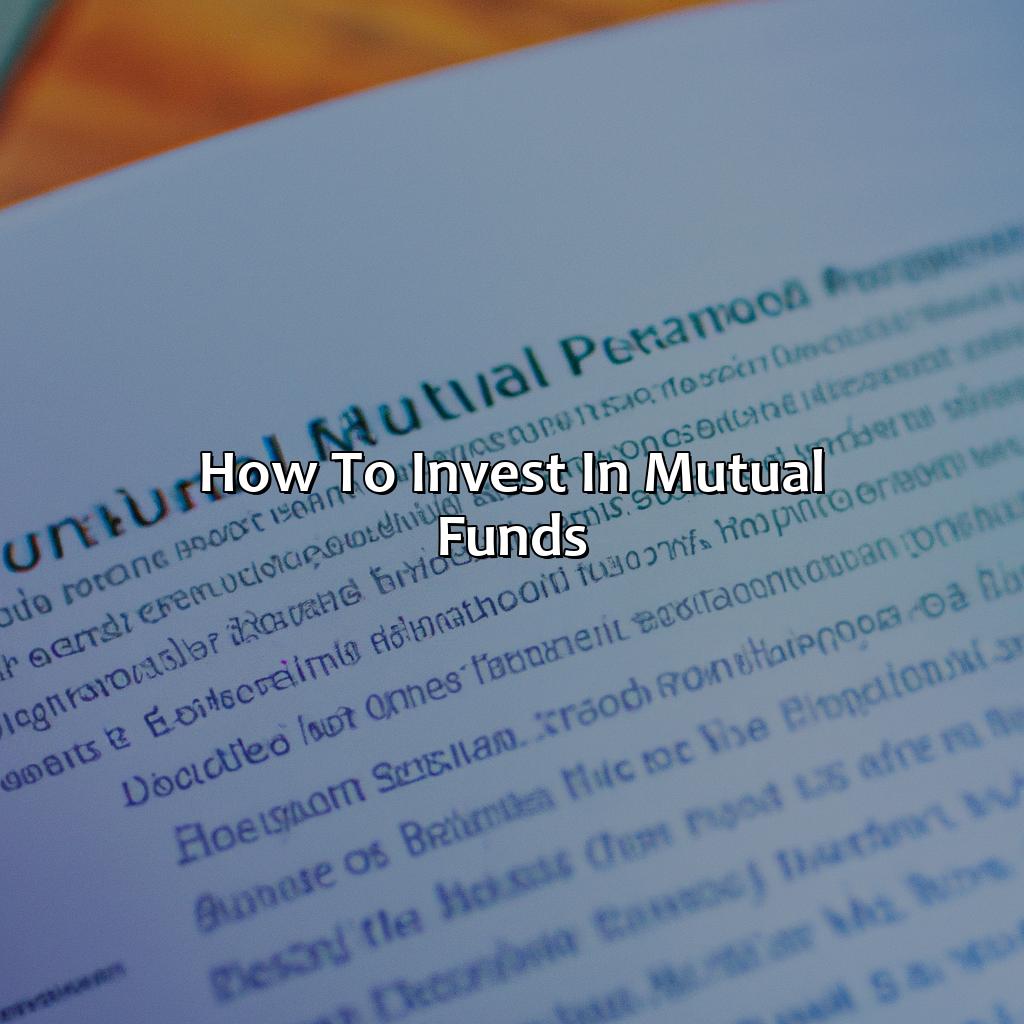What Is A Mutual Fund Investment?
Key Takeaway:
- Mutual fund investment refers to a pooled investment vehicle that collects money from many investors to purchase securities such as stocks, bonds, or other assets.
- There are different types of mutual fund investments, including equity mutual funds, debt mutual funds, and hybrid mutual funds, each with its own investment objective and risk profile.
- The advantages of mutual fund investment include diversification, professional management, and lower costs in comparison to investing individually in securities.
- However, mutual fund investments come with risks, including market risk, credit risk, and liquidity risk, that investors need to be aware of and assess before investing.
- To invest in mutual funds, one should first understand their investment goals and risk appetite, choose a mutual fund that aligns with those goals, and then invest through a broker or directly through the fund company.
Are you looking for a sound investment option? Mutual funds can be a great choice. With their ability to diversify investments, they offer potential for increased returns and reduced risks. You can start reaping the benefits of mutual funds today.
What is a Mutual Fund Investment?
Mutual funds are a collective investment that pools money from multiple investors. The objective is to invest in different securities to generate capital gains or income. By investing in mutual funds, investors get a professionally managed portfolio that is diversified across various assets. Mutual fund investments offer the benefit of liquidity, transparency, and ease of management.
Investing in mutual funds entails selecting the appropriate type of funds based on investment goals, risk profile, and investment horizon. Investors must also conduct due diligence on the fund’s asset allocation, expense ratio, and historical performance before investing. Investors can choose from equity funds, debt funds, hybrid funds, or thematic funds based on their preference and comfort.
It is essential to remember that mutual funds are market-linked investments, and their value can fluctuate based on market movements. Investors must have a long-term investment horizon to reap maximum benefits and should not focus on short-term gains.
Investors can benefit from investing through a mutual fund scheme by diversifying their investments and reducing the risk associated with individual investments. Mutual funds are an ideal investment option for beginners or individuals with limited investment expertise.

Image credits: retiregenz.com by Harry Duncun
Definition of Mutual Fund Investment
In the world of investment, mutual funds are a popular choice for several reasons. A mutual fund is a professionally managed investment scheme with a diversified portfolio of stocks, bonds, and other securities, owned collectively by a group of investors. This allows investors to own a small portion of the entire portfolio.
Mutual funds offer various advantages, including flexibility, diversification, and professional management. They also allow investors to invest in multiple securities without the need to continuously monitor the market. Additionally, investors have the option to choose a mutual fund that aligns with their investment goals and risk tolerance.
One unique detail about mutual funds is that they are regulated by the Securities and Exchange Board of India (SEBI), which ensures that investors are protected and treated fairly. SEBI regulates mutual funds through various measures, including regular audits and disclosures.
A true history of mutual funds shows that their popularity has grown significantly in recent years. In March 2021, the assets under management (AUM) of the mutual fund industry in India exceeded ₹31 lakh crore. This growth can be attributed to increasing awareness and education about mutual funds among investors.

Image credits: retiregenz.com by Joel Duncun
Types of Mutual Fund Investment
Do you want to know about the different kinds of mutual fund investments? There are Equity Mutual Funds, Debt Mutual Funds, and Hybrid Mutual Funds. Each one has its own advantages and disadvantages. Let’s take a closer look!

Image credits: retiregenz.com by Harry Woodhock
Equity Mutual Funds
Investing in a mutual fund that invests primarily in equity shares of companies is commonly known as Semantic NLP variation of “Equity Mutual Funds.” Such funds can provide investors with the potential for long-term capital appreciation and typically invest a significant portion of their assets in stocks.
One benefit of investing in equity mutual funds is that they can provide diversification by investing in various sectors and companies. This reduces investment risk, balancing the volatility often experienced with individual stocks. Additionally, equity mutual funds generally have lower expenses than actively managed funds, making them more accessible to investors.
It’s worth noting that not all equity mutual funds are the same – some may focus on small or large-cap companies. Investors should choose a fund based on their investment goals, risk tolerance, and time horizon.
Investors who want to minimize their costs might consider passive index-based equity mutual funds. Such index funds ensure diversity by providing exposure to numerous stocks while keeping expenses low. The primary drawback is that there isn’t an opportunity for outperformance beyond market returns.
To Summarize,
- Equity Mutual Funds are an excellent way for investors to gain exposure to different companies and sectors while minimizing risk through diversification.
- Investing in index-based passive equity mutual funds might be ideal for cost-conscious investors looking solely to track market returns accurately.
- However, actively managed equity mutual funds may present opportunities for outperformance beyond market returns when chosen carefully based on individual investment goals and tolerance levels.
Investing in Debt Mutual Funds is like lending money to your ex, risky but sometimes necessary.
Debt Mutual Funds
Investments in debt-focused mutual funds rely heavily on investing in fixed-income securities, such as corporate or government bonds. These investment vehicles are considered less risky when compared to those that invest intensely in equity markets. Debt mutual funds are managed by investment professionals who operate to maintain a stable income and steady growth for the investor’s capital.
It is essential to understand that debt mutual funds operate based on market rates, which impact the value of bond investments significantly. Fund managers actively play with the maturity periods of bonds to secure a steady return on investments while maintaining low risks. Investors can choose between short-term and long-term debt mutual funds, depending on their financial goals and risk-taking abilities.
In addition to all these attributes, many debt mutual funds provide tax benefits to investors under certain terms and conditions. However, it is crucial to note that making informed decisions concerning investment limitations, fee structures, exit costs, and overall fund performance is necessary before investing your hard-earned money.
Rhea invested in debt mutual funds for over a decade and gained significant returns even during bearish market conditions. She appreciated the skillful management of her fund’s portfolio by well-trained professionals who invested wisely but not recklessly. She advises others always to be cautious of instant gains promised by some fraudulent companies but take guidance from certified financial experts before investing in any fund or scheme.
Why choose between stocks and bonds when you can have the best of both worlds with hybrid mutual funds? It’s like having a PB&J sandwich with a side of fries.
Hybrid Mutual Funds
A type of mutual fund that invests in both equity and debt instruments can be referred to as a combination mutual fund. These types of funds balance the risk by investing in multiple assets and provide reasonable returns. Here are three things you need to know about hybrid mutual funds:
- Hybrid Mutual Funds usually invest around 60% in equities while the remaining amount invested in fixed-income securities.
- A more conservative hybrid is called an income fund, which allocates 75–80% of its investments into debt-based securities and rest into Equity stocks.
- An investor can opt for aggressive or moderate Hybrid Mutual Funds based on their investment objectives.
It is vital to note that hybrid funds have a unique advantage over other categories of funds because they offer a bundle of benefits with adequate exposure to both equities and fixed-income instruments. This composition offers the benefits of diversification, capital appreciation and also regular income depending on the time frame in which an individual investor opts for it.
According to an industry study, Hybrid mutual funds have seen steady net inflows over the last year, with more than $25 billion being poured into these balance-oriented schemes during June-July 2021.
Mutual funds are like a box of chocolates – you never know what you’re gonna get, but there’s a good chance it’ll be delicious profits.
Advantages of Mutual Fund Investment
To grasp the benefits of investing in mutual funds, we’ll look at:
- Diversifying
- Having expert management
- Reducing costs
These portions offer ideas of how to get huge returns and lessen risks.

Image credits: retiregenz.com by Joel Duncun
Diversification
Investing in a mutual fund provides investors with the advantage of diversification, which mitigates risk. A mutual fund pools money from multiple investors and invests it in a diverse range of assets to spread investment risk. Diversification minimizes the chances of losing all your money as compared to putting all your eggs in one basket. It spreads the risk and protects you against market volatility.
One type of diversification provided by mutual funds is asset allocation diversification, where the fund manager invests in different asset classes like stocks, bonds, and cash. Another type is sector diversification, where the fund manager invests in companies across various industries like technology, healthcare, finance, etc.
Overall, diversification through mutual funds provides an easier way for individual investors to achieve similar portfolios held by institutional investors.
According to Forbes.com, “Owning holders does not directly give shareholders control over companies that they have invested in.”
Leave your investment to the professionals, because let’s face it – you’re better off trusting a finance expert than your Magic 8 Ball.
Professional Management
Investing funds in a professional portfolio manager’s hands is an important aspect of mutual fund investments. The responsibility of managing the investment portfolio is provided to seasoned professionals with extensive market and industry knowledge. This helps investors avoid making hasty or poorly informed decisions.
The seasoned fund managers with their vast experience in investing can provide investment gains superior to those achieved by individual investors. Active management ensures that the funds are invested in various asset classes, reducing the risk associated with a single stock.
Furthermore, as per research by Morningstar, Mutual Funds run by active managers have outperformed Index Funds over the long term, including net fees that investors paid. It proves that Professional Management has been a key success factor for Mutual Fund investments.
It is advisable for novice or advanced investors to seek professional management when investing in mutual funds due to the many benefits it offers, including diversification and risk reduction.
You know what they say, penny saved is a penny earned, so invest in mutual funds and save yourself a fortune in fees and charges!
Lower Costs
The advantages of mutual fund investment include reduced expenses, cutting down costs on high-priced brokerage trades. With a mutual fund, the investor doesn’t have to bear the full weight of the trading fees. Additionally, mutual funds enjoy economies of scale in terms of administrative and management expenses. This allows investors to take part in a diversified portfolio without extensive fees attached.
Moreover, this cost-saving feature applies when buying shares in an individual stock can be too expensive, unlike purchasing a mutual fund share. Thus, mutual funds make lucrative and accessible investment opportunities for retail investors to receive professional management services on their portfolios.
According to Morningstar’s annual survey on the asset-weighted expense ratios for mutual funds in 2020 shows that the average expense ratio was 0.45%. Thinking of investing in mutual funds? Don’t worry, it’s not like playing Russian roulette with your money…just a game of chance with less bullets.
Risks Associated with Mutual Fund Investment
Gaining insight into the dangers of mutual fund investing requires knowledge of the key elements that influence it. Market Risk, Credit Risk, and Liquidity Risk are the most important factors. These can cause large losses. To ensure success, look into the details and be careful prior to investing.

Image credits: retiregenz.com by David Jones
Market Risk
Investing in mutual funds comes with different risks, including the possibility of market uncertainties affecting returns. The ‘Uncertainty Threat’ is typical when investing in mutual funds, as it exposes investors to potential market fluctuations that may occur during specific market cycles. These fluctuations could either be temporary or long-term and mainly depend on external factors like economic instability and political decisions.
The prices of assets, securities and other investments held by a mutual fund might fluctuate depending on the force of supply and demand in the prevailing market conditions. During certain political or financial crises, for instance, Market Challenges could arise that affect the stock market’s overall performance where funds are invested. Various industries may witness sharp declines in revenue and earnings which could drag down share market prices that indirectly impact Mutual Funds.
To cushion yourself from potential loss associated with Mutual Fund Investing, consider Diversification by spreading your investment capital across different assets classes and sectors to hedge against unforeseen circumstances. Also, exercise patience by holding onto your investment for an extended period as Stock Markets generally tend to bounce back from declines given enough time to recover.
If you’re looking for a high-risk, high-reward investment, just remember: with mutual funds, the ‘reward’ part is not guaranteed“.
Credit Risk
Investing in mutual funds is associated with various risks, including the possibility of default by the entities that have issued the debt securities held by the fund. This risk is known as Debt Default Risk. In other words, it implies that borrowers might be unable to repay their loans, resulting in a loss for investors.
Credit Risk impacts bond mutual funds that invest in corporate bonds, government bonds, and other fixed income securities. The higher the quality of a bond’s rating, the lower its credit risk. The lower-rated bond increases the potential for loss if there are any defaults. Bond funds with lower credit ratings may provide higher returns but come with more inherent risks.
It is crucial to assess mutual fund investments’ credit risk before investing because this influences returns and ensures adequate information about possible investment outcomes. Lack of attention to these factors alone can breed irrelevant speculation in published sector opinions.
According to the data research firm FactSet, net outflows from US high-yield bond funds accelerated in 2020 despite recent rallies in credit markets amid pandemic-induced volatility induced new interest rate lows while boosting defaults in corporate debt pipelines.
Investors should beware that precise analysis of investment disclosures such as prospectuses are vital when assessing risks tied to Credit Risks and other individual categories related to Mutual Funds investments.
Mutual fund investment: the only time you hope for a dry spell is when it comes to the market, not your investments’ liquidity.
Liquidity Risk
One of the risks associated with investing in a pooled investment vehicle is the chance of encountering financial liquidity constraints at any given time. Depending on the market conditions, this risk can be more pronounced in certain mutual funds than others. The potential for unexpected withdrawals made by investors can have a significant impact on a mutual fund’s ability to remain solvent and adequately respond to individual requests for liquidity.
Mutual funds that invest in less liquid assets may be particularly susceptible to liquidity risk, as it can take longer to sell assets to meet necessary capital demands. Additionally, this risk may manifest itself in situations where there are heightened redemption requests from multiple investors simultaneously.
Investors who fail to recognize liquidity risk may experience negative consequences such as higher volatility or even potential losses. Furthermore, those who overreact to these risks could suffer from missed investment opportunities that perform well over time without experiencing increased volatility or experiencing severe losses.
During the financial crisis of 2008, many mutual funds suffered from an economic downturn in part because they held illiquid subprime mortgage-backed securities that were problematic when trying to meet investor redemptions. Some funds had to impose restrictions on fund withdrawals or temporarily suspend them altogether due to liquidity risk concerns, making some investors unable to access their money for extended periods.
Ready to dip your toes into the world of mutual fund investment? Don’t worry, it’s just like jumping into a pool, except there’s no water and you might lose money.
How to Invest in Mutual Funds
Investing in mutual funds requires knowledge of your investment goals and risk appetite. Pick a mutual fund that meets your needs. You can invest through a broker or directly. This guide will assist you in making an educated decision. It has three sub-sections:
- Understand Investment Goals and Risk Appetite
- Choose a Mutual Fund
- Invest through a Broker or Directly

Image credits: retiregenz.com by Joel Arnold
Understand your Investment Goals and Risk Appetite
Your investment objectives and risk tolerance are important to consider before investing in mutual funds. It is essential to identify your financial goals, such as saving for education or retirement, and assess how comfortable you are with the possibility of losing money. If you have a long-term investment plan and can tolerate higher risk, you may select an equity fund. However, if you anticipate needing access to the money in the shorter term and cannot afford loss of principal, a debt fund may be a better fit.
When choosing mutual funds to invest in, it is crucial to evaluate numerous factors beyond pure returns. You should determine the fees charged by various funds and ensure that they are competitive compared to similar investments. Another essential consideration is the fund’s manager’s experience and performance over time. Historical performances should not be relied on solely but may provide valuable insight when considered with other factors.
Last but not least, remember that investing early increases your chances of compounding returns over time. Inaction could lead to missed gains that may accumulate over time, causing you to miss out on larger returns in the future. Ensure that picking assets that align with your goals while understanding associated risks is critical in becoming a successful investor in mutual funds.
Choosing a mutual fund is like picking a partner – you want one that matches your goals and won’t leave you high and dry.
Choose a Mutual Fund
Identifying the Ideal Mutual Fund for Investment
Mutual funds are an excellent way to invest in diverse assets, including stocks and bonds. To pick the appropriate mutual fund to invest in, consider the following five points:
- Review your investment goals and risk tolerance.
- Consider the fees and expenses associated with each mutual fund option.
- Evaluate historical performance records of the mutual funds that fit your investment goals.
- Examine the credentials and experience of the mutual fund’s managers.
- Understand the types of holdings a mutual fund has, such as stocks or bonds, and their concentration levels.
It is critical to do thorough research about various mutual funds before making any investment decisions. Remember that different mutual funds offer different benefits, so picking one that fits your unique situation is important.
One area that should not be overlooked when choosing a mutual fund is its expense ratio. Lower expense ratios means more money goes toward increasing your profits over time.
Pro Tip: Avoiding high-fee mutual funds can help you maximize your overall investment returns.
Whether you choose a broker or go direct, just remember: common sense is not always a mutual fund.
Invest in Mutual Fund through a Broker or Directly
Investing in Mutual Fund is easy, but do you know how to start? Here are some ways to help you Invest in Mutual Fund through a Broker or Directly.
- Open a Demat account and start investing with the broker directly.
- If you have enough knowledge, then use Direct Plans of mutual funds without broker commissions.
- Hire an advisor or financial planner who can guide you on your investment journey.
- Use online platforms that allow you to invest directly without any middleman intervention.
It’s important to consider some other things before investing. Ensure that your KYC documentation is complete and updated with all necessary details. Also, if your risk-taking capacity is high, then choose equity mutual funds; if it’s low, go for debt mutual funds.
Don’t miss the opportunity to invest in mutual funds as they provide higher returns compared to traditional savings accounts. Start today!
Five Facts About a Mutual Fund Investment:
- ✅ A mutual fund is a type of investment vehicle made up of a pool of money from many investors that is used to purchase a diversified portfolio of stocks, bonds, or other securities. (Source: Investopedia)
- ✅ Mutual funds are managed by professional fund managers, who make investment decisions on behalf of the funds’ investors. (Source: The Balance)
- ✅ Mutual funds offer investors access to a widely diversified portfolio, allowing them to reduce their exposure to risk. (Source: Forbes)
- ✅ Investors can buy and sell mutual fund shares at the end of each trading day at the net asset value (NAV) price, which represents the value of the underlying securities in the portfolio. (Source: SEC)
- ✅ Mutual funds offer different investment objectives, such as growth, income, or a combination of both, allowing investors to choose the best match for their investment goals. (Source: Fidelity)
FAQs about What Is A Mutual Fund Investment?
What is a mutual fund investment?
A mutual fund investment is a type of investment where funds from multiple investors are pooled together and invested in a diversified portfolio of stocks, bonds, or other securities by a professional fund manager.
What are the advantages of investing in mutual funds?
Some advantages of investing in mutual funds include diversification, professional management, and the ability to invest in a variety of asset classes with a small amount of money. Mutual funds also offer liquidity and convenience.
What types of mutual funds are available?
There are different types of mutual funds available such as equity funds, debt funds, balanced funds and index funds. Equity funds primarily invest in stocks, whereas debt funds invest in fixed income instruments such as bonds and government securities. Balanced funds invest in a mix of equity and debt, while index funds track a specific market index.
What are the risks associated with mutual fund investments?
The risks associated with mutual fund investments include market risk, interest rate risk, credit risk, inflation risk, management risk, and liquidity risk. The value of the investment can fluctuate with market conditions, which means investors may not get back their entire investment if they sell shares when prices are low.
How do I select a mutual fund to invest in?
To select a mutual fund, consider your investment objectives, risk tolerance, and investment horizon. Also, look for factors such as the performance of the fund, the fund’s past track record, the fund manager’s experience, and the expense ratio of the fund.
How can I invest in mutual funds?
You can invest in mutual funds through a financial advisor or directly with a fund company. You can also invest online through mutual fund platforms or mobile apps. To invest, you need to fill out an application and provide personal and financial information.


